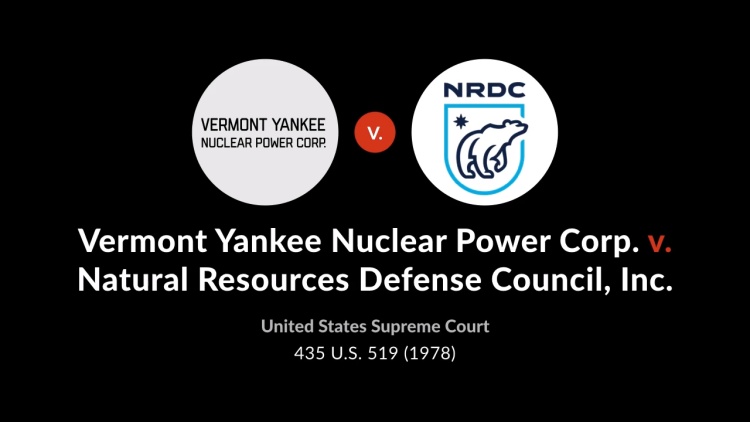Vermont Yankee Nuclear Power Corp. v. Natural Resources Defense Council, Inc.
United States Supreme Court
435 U.S. 519 (1978)

- Written by Eric Cervone, LLM
Facts
The Natural Resources Defense Council, Inc. (NRDC) (plaintiff), a nonprofit environmental interest group, and others filed a petition in federal court seeking review of an Atomic Energy Commission (commission) (defendant) decision to grant a license to the Vermont Yankee Nuclear Power Corporation (defendant) to operate a nuclear power plant in Vermont and a decision to grant a license to Consumers Power Corporation (Consumers) to construct two pressurized-water nuclear reactors to generate electricity and steam. The plaintiffs claimed the commission’s environmental-impact statement (EIS), prepared pursuant to the National Environmental Policy Act (NEPA), was insufficient because it failed to address energy-conservation alternatives to the construction of the plant and reactors, proposed by several plaintiffs. The plaintiffs also argued that the commission denied a meaningful opportunity to participate in rulemaking proceedings because the absence of discovery or cross-examination rendered the proceedings inadequate. Upon finding that the procedures followed during the hearing were indeed inadequate, the United States Court of Appeals for the District of Columbia Circuit remanded the rule to the commission. The court found that employing full formal adjudicatory procedures during rulemaking hearings would create a more adequate record and would give interested parties a better opportunity to participate in the proceedings. Such procedural requirements were not included in the commission’s existing rulemaking processes. The United States Supreme Court granted certiorari.
Rule of Law
Issue
Holding and Reasoning (Rehnquist, J.)
What to do next…
Here's why 905,000 law students have relied on our case briefs:
- Written by law professors and practitioners, not other law students. 47,100 briefs, keyed to 995 casebooks. Top-notch customer support.
- The right amount of information, includes the facts, issues, rule of law, holding and reasoning, and any concurrences and dissents.
- Access in your classes, works on your mobile and tablet. Massive library of related video lessons and high quality multiple-choice questions.
- Easy to use, uniform format for every case brief. Written in plain English, not in legalese. Our briefs summarize and simplify; they don’t just repeat the court’s language.





